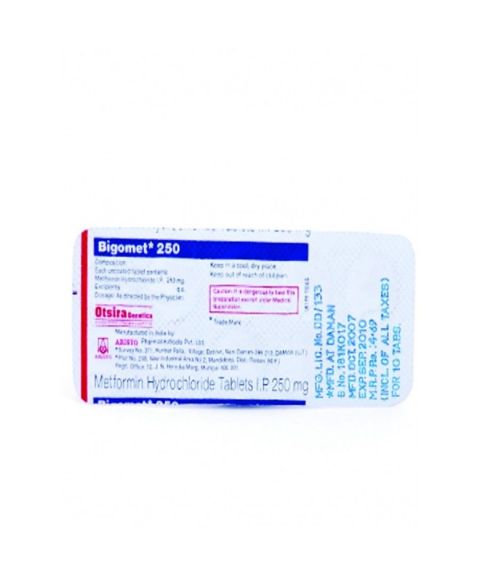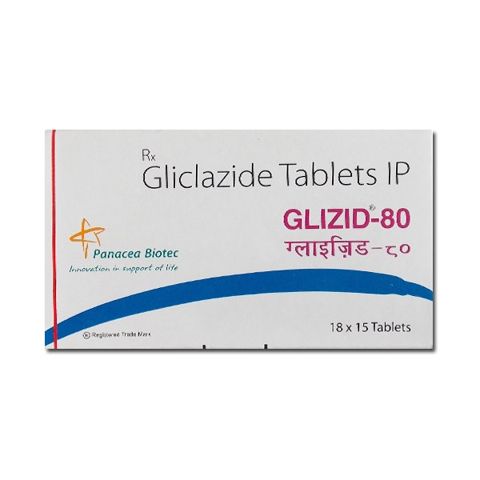Bigomet 250 mg
Bigomet 250 mg is a medication containing metformin, prescribed primarily for managing type 2 diabetes mellitus. It functions by decreasing glucose production in the liver and increasing insulin sensitivity in the body. This helps regulate blood sugar levels and reduces the risk of complications associated with diabetes.
It is typically taken orally, with dosages adjusted based on individual response and medical condition. Its efficacy in controlling blood sugar levels makes it an essential component of many diabetes management plans. However, it's important to consult a healthcare professional for proper dosage and monitoring to ensure safe and effective treatment with it.
Uses Bigomet 250 mg
Bigomet 250 mg, containing metformin, serves as a crucial medication for managing type 2 diabetes mellitus. It effectively controls blood sugar levels by reducing glucose production in the liver and increasing insulin sensitivity in the body's tissues.
Additionally, it may be prescribed to treat polycystic ovary syndrome (PCOS), aiding in regulating menstrual cycles and improving fertility in affected individuals.
This versatile medication is often used in conjunction with lifestyle modifications such as diet and exercise to achieve optimal blood sugar control and reduce the risk of long-term complications associated with diabetes. Always consult a healthcare professional for personalized treatment recommendations.
Available Strengths
How to use it?
To use Bigomet 250 mg effectively, follow your healthcare provider's instructions meticulously. Typically, take one tablet orally with meals, once or twice daily. Swallow the tablet whole with a full glass of water. It's crucial to maintain a consistent dosing schedule to optimize its benefits. If you miss a dose, take it as soon as you remember unless it's nearly time for your next dose.
Avoid doubling the dose to compensate. Regularly monitor blood sugar levels as directed by your doctor and promptly report any concerning symptoms. Always adhere to your doctor's guidance for safe and effective use of the medicine.
Benefits
Bigomet 250 mg offers several benefits for individuals with type 2 diabetes. By effectively lowering blood sugar levels, it helps reduce the risk of long-term complications associated with diabetes, such as heart disease, kidney damage, and nerve damage. Additionally, it may aid in improving insulin sensitivity and regulating menstrual cycles in individuals with polycystic ovary syndrome (PCOS), thereby enhancing fertility.
Its versatility and efficacy make it a valuable component of comprehensive diabetes management plans. Always consult a healthcare professional for personalized treatment recommendations.
Side Effects
- Common side effects of Bigomet 250 mg may include: • Gastrointestinal discomfort such as nausea, vomiting, or diarrhea. • Loss of appetite or metallic taste in the mouth. • Headache or dizziness. • Muscle pain or weakness.
- In rare cases, more serious side effects may occur, including:
- • Lactic acidosis, a potentially life-threatening condition. • Vitamin B12 deficiency. • Hypoglycemia (low blood sugar) when used with other diabetes medications. • Allergic reactions such as rash, itching, or swelling of the face, tongue, or throat
Precautions
Before using Bigomet 250 mg, consider the following precautions:
- Inform your healthcare provider about any existing medical conditions, especially kidney or liver problems.
- Discuss all medications, including over-the-counter drugs and supplements, with your doctor to avoid potential interactions.
- Pregnant or breastfeeding individuals should consult their doctor before using Bigomet 250 mg.
- Regular monitoring of kidney function is recommended while on Bigomet to prevent complications.
- Be cautious when driving or operating machinery, as Bigomet may cause dizziness or drowsiness in some individuals.
- Stay hydrated and maintain a balanced diet to reduce the risk of gastrointestinal side effects
Conclusion
Bigomet 250 mg is an invaluable medication for effectively managing type 2 diabetes and related conditions like polycystic ovary syndrome (PCOS). By lowering blood sugar levels and improving insulin sensitivity, it helps reduce the risk of diabetes-related complications and enhances overall health outcomes.
While generally well-tolerated, it's important to be aware of potential side effects and adhere to precautions outlined by healthcare professionals. With proper usage and regular monitoring, it can significantly contribute to better disease management and improved quality of life for individuals living with diabetes and PCOS. Always consult with your healthcare provider for personalized guidance.
Your review is submitted successfully. It will be live after approval, and it takes up to 24 hrs.







